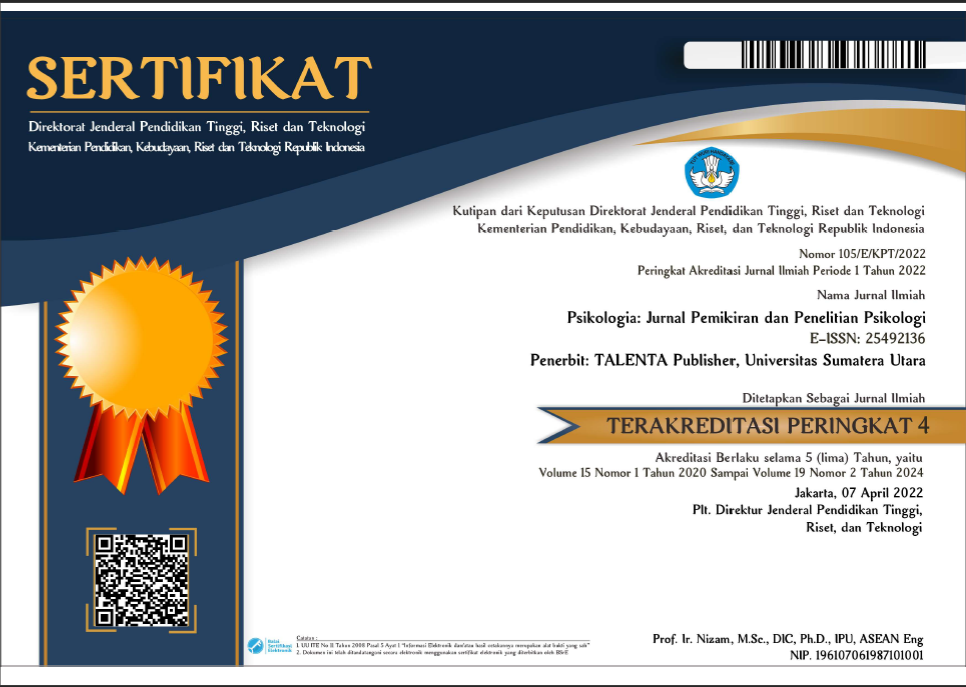The effect of intergroup contact toward social stigma towards survivors of COVID-19
Pengaruh intergroup contact terhadap stigma sosial pada penyintas COVID-19
DOI:
https://doi.org/10.32734/psikologia.v16i2.7377Keywords:
intergroup contact, social stigma, COVID-19Abstract
This study examines the effect of intergroup contact on social stigma among survivors of COVID-19. Participants were 25 people recruited incidentally. We assigned participants to communicate via a video conference platform with survivors of COVID-19 to induce contact. We measured participants' stigma towards survivors of COVID-19 before and after the contact treatment. There was no significant reduction of stigma after the video conference contact.
Penelitian ini mengkaji pengaruh kontak antar kelompok terhadap stigma sosial di kalangan penyintas COVID-19. Partisipan berjumlah 25 orang yang direkrut secara incidental. Kami menugaskan peserta untuk berkomunikasi melalui platform konferensi video dengan para penyintas COVID-19 untuk mendorong kontak. Kami mengukur stigma peserta terhadap penyintas COVID-19 sebelum dan sesudah treatment kontak. Tidak ada pengurangan stigma yang signifikan setelah partisipan melakukan kontak melalui konferensi video.
Downloads
References
Allport, G. W. (1954). The nature of prejudice. Reading, MA: AddisonWesley.
Ahorsu, D. K., Lin, C. Y., Imani, V., Saffari, M., & Griffiths, M. D. (2020). The fear of COVID-19 scale: Development and initial validation. International Journal of Mental Health and Addiction. https://www.ncbi.nlm.nih.gov/pmc/articles/PMC7100496
Bhattacharya, P., Banerjee, D., & Rao, T. S. (2020). The “untold†side of covid-19: Social stigma and its consequences in India. Indian Journal of Psychological Medicine, 42, 382–386. https://doi.org/10.1177/0253717620935578
Christ, O., Schmid, K., Lolliot, S., Swart, H., Stolle, D., Tausch, N., Al Ramiah, A., Wagner, U., Vertovec, S., & Hewstone, M. (2014). Contextual effect of positive intergroup contact on outgroup prejudice. Proceedings of the National Academy of Sciences of the United States of America, 111, 3996–4000. doi:10.1073/pnas.1320901111
Corrigan, P.W., Morris, S.B., Michaels, P. J., Rafacz, J.D. & Rüsch, N. (2012). Challenging the public stigma of mental illness: A metaanalysis of outcome studies. Psychiatric Services, 63, 963-973. https://doi.org/10.1176/appi.ps.201100529
Eisenberg, D., Hunt, J., Speer, N., & Zivin, K. (2011). Mental Health Service Utilization Among College Students in the United States. The Journal of Nervous and Mental Disease, 199, 301–308. https://doi.org/10.1097/nmd.0b013e3182175123
Hebl, M., & Kleck, R. E. (2000). The social consequences of physical disability. In T. F Heatherton, R. E. Kleck, M. R. Hebl, & J. G. Hull (Eds.), Stigma: Socialpsychological perspectives (pp.419-440). New York: Guilford.
Jang, Jieun & Lee, Sang Ah & Kim, Woorim & Choi, Young & Park, Eun-Cheol. (2018). Factors associated with mental health consultation in South Korea. BMC Psychiatry. 18. doi:10.1186/s12888-018-1592-3.
Oikarainen, A., Mikkonen, K., Kenny, A., Tomietto, M., Tuomikoski, A. M., Meriläinen, M., Miettunen, J., & Kääriäinen, M. (2019). Educational interventions designed to develop nurses' cultural competence: A systematic review. International Journal of Nursing Studies, 98, 75–86. https://doi.org/10.1016/j.ijnurstu.2019.06.005
Pettigrew, T.F., & Tropp, L.R. (2011). When Groups Meet: The Dynamics of Intergroup Contact (1st ed.). Psychology Press. https://doi.org/10.4324/9780203826461
Ramaci, T., Barattucci, M., Ledda, C., & Rapisarda, V. (2020). Social Stigma during COVID-19 and its impact on HCWs outcomes. Sustainability, 12, 3834. https://doi.org/10.3390/su12093834
Riyasad, N. (2020, April 26). COVID-19 and mental health around the world. New age. Retrieved from https://www.newagebd.net/article/105119/covid-19-and-mental-health-around-the-world
Published
How to Cite
Issue
Section
License
Copyright (c) 2021 Psikologia: Jurnal Pemikiran dan Penelitian Psikologi

This work is licensed under a Creative Commons Attribution-ShareAlike 4.0 International License.








